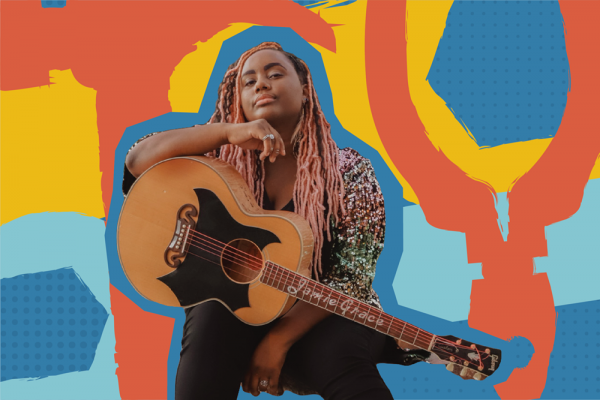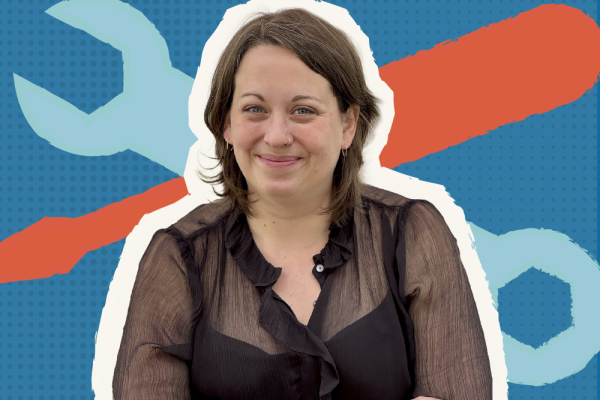This interview is part of The Reconstruct, a weekly newsletter from Sojourners. In a world where so much needs to change, Mitchell Atencio and Josiah R. Daniels interview people who have faith in a new future and are working toward repair. This week features a guest interview by Sojourners associate editor Darren Saint-Ulysse. Subscribe here.
As I remember it, I was first introduced to Jamie Grace’s career while listening to a Christian radio show in 2011.
At the time, she was a 19-year-old college student majoring in child and youth development, recently signed to a major Contemporary Christian Music (CCM) label, and was less than a year away from being nominated for the 2012 Grammy Award for Contemporary Christian Music Song. She was a Black woman in an industry largely made up of white men; she was open about her diagnoses of Tourette syndrome, attention-deficit/hyperactivity disorder, and obsessive-compulsive disorder at a time when I wasn’t aware of many people who were; and she was a very skilled guitar player, songwriter, and singer. As such, it seemed obvious that she had a bright future in an industry that needed new energy.
In 2016, after two albums and four radio number one singles, she announced that, after contemplating retiring, she would instead become an independent artist, warning against the danger of placing anyone other than Jesus on a pedestal. Though she has stated that she cannot legally discuss why she left, it has become clear that this was more complicated than the run-of-the mill label departure due to simple creative differences. In the eight years since, no CCM label has signed her, despite her history of producing chart-topping songs.
When we talked, a week after Juneteenth, my mind was on the online controversy that radio giant K-LOVE generated after posting an image with the word “Juneteenth” on its social media. Several commenters accused the station of being “woke,” “pandering,” or conforming to the “ways of the world.” And while some applauded them, many others said they’d stop listening to K-LOVE altogether. Grace told me she considered sharing the post to one of her social media accounts with a caption that said something like, “If y’all ever want to know why my career don’t look like it used to, look at these comments.”
Amid the challenges of being an independent artist, Grace’s career has continued: Among other things, she has released three full-length albums (and just released a new single, “One of Those Days,” in June), wrote Finding Quiet: My Journey to Peace in an Anxious World, and makes lo-fi music under the artist name lithoniaa. But I especially wanted to talk to her ahead of her forthcoming The New Kids Camp, one of the ways that she is working to mentor kids and teens.
At The Wonder Space, her studio in Atlanta, Grace offers producing and coaching, leads The New Kids Choir for youth interested in pursuing careers in Gospel, Christian, and pop music, and hosts the aforementioned camp of the same name. In our interview, we talked about her experience as a “teen star” in the contemporary Christian music industry and the studio, choir, and camp that she is building now.
This interview has been edited for length and clarity.
Darren Saint-Ulysse, Sojourners: Do you still consider yourself part of the Christian music industry?
Jamie Grace: I do! Do they?
I just auditioned to sing for our church’s worship band. They were like, “You don’t have to audition.” And I was like, “No, I wanna audition. I wanna be like everybody else.” I’m literally a little Christian singer out here!
As far as CCM goes, because I’m not a signed artist, it’s harder to claim that world, if you will. But I like to think of some of the weirdos of my time — the Amy Grants and the Relient Ks — that were off the beaten path just a little bit. I definitely consider myself a Christian artist still. I’ve just been doing my own thing.
There’s so much that I think we could talk about there. [In preparation for this interview,] I was thinking about you once saying that you used to not publicly celebrate Juneteenth for fear of losing your job or whatever the case may be. And I’m not sure if you saw the Juneteenth post—
From K-LOVE? It took everything within me not to comment on that post. I have never felt more understood. I almost reposted it and said, “If y’all ever want to know why my career don’t look like it used to, look at these comments.”
And K-LOVE — those aren’t even Black people [celebrating Juneteenth]! Imagine me, a young Black woman, talking about [this] stuff.
Yeah, I saw those comments, I read about eight of ‘em and I went, “Let me get out of here.”
So, let me ask you this: Do you think the CCM industry is a net positive?
I don’t say this to sound politically correct, but I will say, I believe that God can use any and everything. [I believe that] as a foundational principle.
I want to speak to the CCM that I grew up with first, because even now that is the CCM that I’m deeply, emotionally connected with. Through all of the trauma and challenges that I faced … I watched a Point of Grace live stream the other day. I was giggling so much because I’m still such a fan. I was so embarrassed. I had to text my sister, “Point of Grace is live!” Now, granted I’ve met and worked with these women, but I don’t care. It’s Point of Grace!
I also include gospel music and the crossover of [CCM and] gospel. People like CeCe Winans and Nicole C. Mullen. [There were other CCM artists like] Plus One, Superchick, and BarlowGirl, and further back to Rich Mullins and Third Day — [I’m] talking about these people.
I don’t think it’s the same thing now that it was then. Even from a production standpoint — not talking about faith but [just] about music — [some of the] quality has been lost. It saddens me to see. [But] I don’t know how fair it would be for me to speak too much on modern day CCM, just because I’ve been out for a minute.
It’s weird because I didn’t know that it was an industry. I know that sounds very naïve — and that’s precisely how I entered the industry: incredibly naive. I went in, starry eyed at this ministry opportunity that also happened to be adjacent to my job.
I remember a few months into working on one of my songs on my first record, one of the executive producers said something about “the industry.” They said it in passing. It was a very long time before I processed what they meant. They literally meant it’s an industry. Because I thought CCM was a genre.
It wasn’t until I left the label. I realized that I was pretty much shunned from working with anybody else. Which I’m not positive as to why … we’ll never know.
[After I left my label,] I took my album ’91 that I wrote and co-executive produced and I shopped it around to a bunch of different CCM labels before it came out — this is pretty fresh off of the height of [the single] “Beautiful Day.” None of them were interested.
Again, call me naïve, but it was then, in 2016 [that I realized], oh, this is an industry, and they are gatekeeping me from going back in.
But I also struggle with too much criticism of [CCM] publicly because I don’t like the concept of, “Alright, everybody, let’s get together and have public discourse about our private issues.” You know what I mean?
But, as a consumer, it changed my life, and there are musical production elements of ’90s and early 2000s CCM that are gone with the wind, but never forgotten. As an artist, I had a really hard time getting rejected from CCM when, months before that, I was a CCM sweetheart.
But it is what it is, that was a season of my life, and I’m not a CCM artist anymore. But it does not mean that I don’t absolutely love Jesus or that I’m not making music to please him anymore.
When you talk about your love of the CCM of the 1990s and 2000s, I get it. My sister and I recently gleefully sat down and watched a Michael W. Smith concert in which he sang some of his older songs.
I was just listening to “Missing Person” the other day.
We are convinced that he has the best Christmas albums out of anyone. As far as the work you’re doing now, you’ve built a studio called The Wonder Space. Can you tell me about it?
I always wanted to have my own studio because I really like producing music. I want it to always be a studio for the next generation. I want it to be a “dry” studio for women [and] for people in general. I didn’t always have that privilege or choice. [A dry studio is a recording studio where alcohol is not permitted.] I wanted to have a safe studio for women. I wanted to have a studio where young people knew that their parents were welcome. I don’t care what knowledge of the industry those parents have: If you want your parents here, your parents are welcome here. End of discussion.
With so many gaps that were missing in my career as a young artist and in the lives of other artists, I just wanted to create a safe space. When I got famous at 19, I bought a house in my hometown, Lithonia, Ga., [outside Atlanta]. My husband Aaron and I were considering selling this house, and I was just like, “Wait a minute. What if I made it a studio?”
My dad’s an electrician, my husband is insanely strong, my brother-in-law knows a lot of carpentry stuff, and I’m a nerd and know a lot about video and lighting. By the time we were finished with my control room, we built out a choir room. I had a dream of having a kids’ choir. I didn’t tell anybody, and then my mom randomly came to me one day, and said “Jamie, I think you need to start a kids’ choir.” All these really beautiful things just started to come into play.
I think it would be super cool to go back on tour someday, especially to show my daughter, this is what mommy did back in the day, but, man, sitting in the space in the studio and creating with young people and getting to fulfill their dreams has been really cool.
I imagine that, after all you’ve been through, you could have chosen not to encourage people to be part of the world that you were in. But I noticed on your website that The New Kids Choir is for kids and teens wanting to “pursue careers as songwriters and/or artists in Gospel, Christian, and Pop music.” How do you hope that the environment that you’re creating through the choir, the camp, and the studio, is different from your experience in the industry?
Especially when I was pregnant, people asked, “Would you ever let your kid go into the music industry?” I really struggled with the idea that my experience was supposed to stop God’s calling. To me, that question is, if [one day] God calls your 15-year-old to do this, [am I] going to say no, ’cause that man said this when I was 15?
I wouldn’t say that’s where it started for me, but that’s where a lot of it is rooted. We can do better. We can always do better.
The businesswoman that I am now at 32 did not exist when I was 19. My mom has always been a phenomenal businesswoman and a phenomenal mom and manager. And she’s the reason why I’m sane after being a teen star. But I was not a good businesswoman at 19. I was naïve, and I called everyone “family” because I was told to call everyone “family,” and I just jumped right in.
It would be very easy to sit back and become jaded and say the industry is just a mess. Or, I could look at the reality that other kids are going to want to pursue [a career in Christian music]. Other kids are going to go into this. Like it says in Ecclesiastes, there’s nothing new under the sun. I wasn’t the first teen star, and I won’t be the last. So, how can I help these kids and teens and young women develop their own village around them and develop their own support system?
[For example,] one of the clients that I’m working with, she wants the instrumental to the song that she’s working on. My first thing was, “I will teach you how to create the instrumental from the tracks … because I didn’t learn how to do that until four years into my career. And I don’t want you dependent on a producer to do something that you can do yourself.”
Now, if you need the producer, you need the producer, but I guess that’s — [pauses] — a lot of the stuff that I went through wasn’t my fault. A lot of it was naivete and whatever [pauses] but it’s just, like, I didn’t think — one rule that I’ve made for myself and that I make all of my clients follow: You never go to the studio alone. I don’t care how old you are. You just don’t go to the studio alone. And that’s a rule that I did not follow. There were things that happened in studio settings that made me uncomfortable multiple times. And I never knew how to speak up for myself. I wish I had a friend or a cousin with me.
So, what I’m hoping to do is to empower young people with the tools to be able to say, “Hey, this is what God has called me to do. This is what I need in order to be able to do that. This is what I’m good at, and this is what I need to be in order to be able to do what I’m good at as well.”
In a recent YouTube video, you mentioned the temptation to “outdo [your] past self.” How do you manage your optimism in a world that often doesn’t give reasons for that?
I love to cry. Favorite hobby. Get it all out.
I don’t want to give a false impression that I enjoy sadness as a negative, but I do lean into it. I do lean into the heavy and difficult. I do not shy away from crying.
I was crying about something work-related yesterday. And my daughter came in the room and [asked], “What’s going on?” And I said, “Honestly, girl, somebody that was working with us, they made me sad … and I needed to get my feelings out, I just keep crying about it. I’m just so sad.” And she was like, “Oh man!” I was like, “I know.” And we just hugged about it.
I’m a heavy feelings person, but also very pro-therapy.
I try to be intentional about not staying physically in the house too long. It is my favorite place to be — I could just stay in here for years! Church has been something that has been super helpful for that. I love [all the] positive benefits of church as a follower of Jesus. But I also love church because of the consistency of a weekly place to go [to see] people that you know — [a place where] I have to put on deodorant!
My face-to-face, local community is keeping me alive. My church, my husband, I live close to my parents. I don’t know if it’s the season, if it’s the climate of the world, but … I need to know that my sister is close. I need to know that my nephew and brother-in-law [are close]. So yeah, my local community is what’s helping me survive.
I have to get face-to-face with my community … I don’t ignore [global, existential] issues, but [I’m] finding the balance of not being chronically online and not thinking exclusively global.
Like the [K-LOVE] Juneteenth thing. [As] I was looking through those comments, I was like, “What white person do I know — in person — that I could talk to?” Because if I’m really itching to educate, is it going to be beneficial to try to educate this lady [on Instagram] that already decided she don’t listen to Jamie Grace no more? Or do I try to educate somebody in my local community?
Got something to say about what you're reading? We value your feedback!







